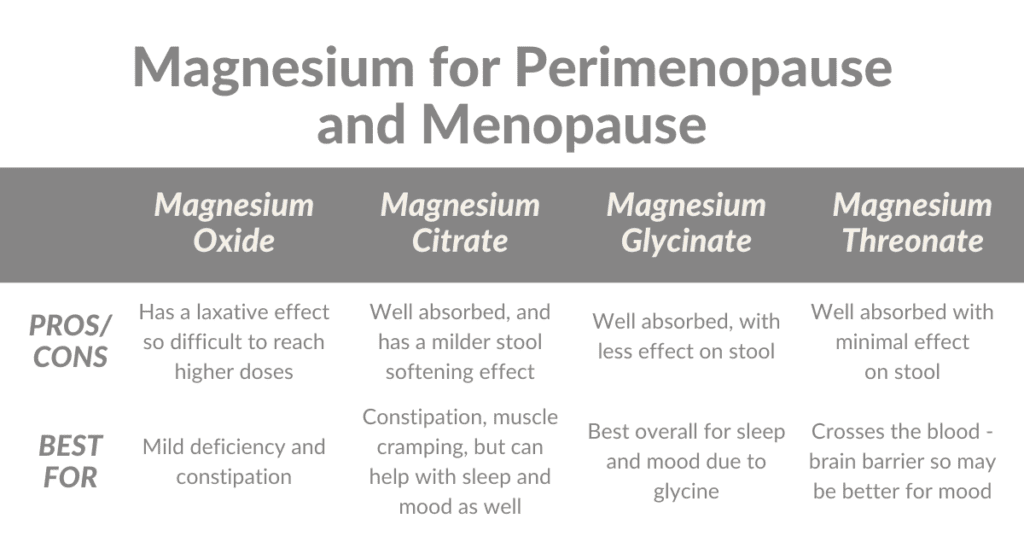Built to help women have a 360° approach to health through perimenopause to post-menopause.
welcome to MY BLOG
Magnesium With Menopause and Perimenopause

May 23, 2022
Magnesium is a mineral that plays a vital role in muscle and nerve functions along with helping our energy levels. We can get our magnesium from both plant and animal foods that we eat. For example, dark, green leafy vegetables are just some of the great sources of magnesium that we can find in our diets. Dried beans such as soybeans and peanuts are also great sources of magnesium that we can integrate as a part of our daily diets.
Why do we need magnesium? Many studies have shown that many women have an equal or lower amount of magnesium than the recommended amount of 240 mg/day. Some studies also say that this encompasses 40% to 60% of women.
The researchers found that the refining processes and the declining levels of magnesium in soil are key factors as to why people are not getting enough magnesium these days.
What happens when we don’t get enough magnesium? Magnesium deficiency manifests in many different ways. More often than not, people tend to dismiss these symptoms and not take them seriously even when they really should. Some of these symptoms include muscle cramps, heart rhythm abnormalities, vomiting, fatigue, nausea, and even seizures.
Blood tests are also not that reliable when it comes to finding out whether we have magnesium deficiency or not. This is because only about 1% of the total magnesium content in our body is found in the blood. This, therefore, makes testing for deficiency through blood tests difficult to trust.
Magnesium with menopause and perimenopause
Some women may start taking supplements that can help augment the amount of magnesium in their diets when they reach their 30’s, 40’s and 50’s. This is because there have been many stories of women treating their perimenopausal and menopausal symptoms with magnesium.
While some evidence for some types of magnesium such as magnesium oxide and magnesium glycinate have been found to reduce symptoms such as hot flashes, overall there is still a mixed finding when it comes to clinical trials over the effects of magnesium for symptoms like hot flashes.
Magnesium and quality of sleep
According to many studies, magnesium can work well with melatonin when it comes to getting a better quality of sleep. Magnesium can help the body relax and reduce stress levels as melatonin helps us feel more sleepy faster.
This makes it worthwhile to consider taking magnesium supplements if you ever have difficulty getting enough sleep. This is especially true if lack of sleep is part of the symptoms you experience from menopause and perimenopause.
Magnesium and better moods
Mood swings along with hot flashes are some of the most common symptoms we experience as part of perimenopause and menopause. Some women also deal with increased irritability, stress, anxiety, and pressure from many factors such as fluctuations in hormone levels.
There have been some studies that associate magnesium deficiency with depression, insomnia, and low mood. Hence, it will be beneficial for you to supplement your magnesium intake if you think you’re experiencing these symptoms due to magnesium deficiency. Do remember to consult with your trusted physicians and clinics to know how much dosage you can safely take.
Magnesium and other aspects of our lives
Having a healthy and well-balanced diet is probably one of the main reasons most people supplement magnesium into their diets every day. As mentioned before, magnesium deficiency is more common than we think, especially when it comes to women. So, by eating more dark green leafy vegetables, dried beans, and other foods that have magnesium in them, we are able to make our diets more balanced.
However, if you’re thinking of using magnesium for therapeutic purposes, then you might want to take a look at this picture of our chart over here:

Bottom line
Magnesium deficiency is more widespread than we actually think. This is especially true for women undergoing perimenopause and menopause whose symptoms may be caused by a lack of enough magnesium in their diets. Hence, getting more magnesium-rich foods into your diet will be optimal if you want to reduce the symptoms of perimenopause and menopause. Just remember that this will not always be the case for everybody, but it’s also worthwhile to make our diets and nutritional levels more well-balanced!
Want more midlife nutrition information you can trust?
Find out more here 👇🏻
Want your FREE copy of my “mental & emotional well-being during perimenopause & menopause”
Leave a Reply Cancel reply
I have a reputation as a compassionate and innovative therapist who produces rapid and lasting changes with my clients. Are you ready to become my next success story?
Website Designed W/ Love By Traveller By Trade
Copyright © 2021, Louise The Therapist
Privacy Policy